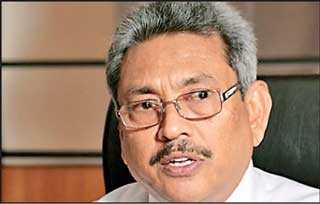Monday Feb 23, 2026
Monday Feb 23, 2026
Wednesday, 24 July 2019 00:16 - - {{hitsCtrl.values.hits}}
Reports that Gotabaya Rajapaksa’s name does not appear on the US government’s quarterly list of citizens who have renounced their American citizenship have cast a calculated doubt on the former Defence Secretary’s Presidential ambitions.
 |
Gotabaya Rajapaksa |
On 13 May, the US inland revenue agency, the Internal Revenue Service (IRS), filed a “quarterly publication of individuals who have chosen to expatriate”, or give up American citizenship, as required by the US tax laws. Rajapaksa’s name did not appear on this form, sparking confusion as to whether or not he remains a US citizen.
The confusion has roots in the former Defence Secretary’s own wildly conflicting statements on the topic over the years. On 5 July 2015, in a television interview, he claimed that he had handed in documents to renounce his US citizenship. Then, outside the Katunayake Airport on 13 February 2018, he stated he was still a US citizen, and therefore unable to take oaths as Prime Minister.
Outside the FCID on 25 June 2018, Rajapaksa claimed he was “taking steps” to renounce his US citizenship. Outside the Permanent High Court at Bar on 19 October 2018, he claimed “there is no problem with regard to my citizenship, and I can revoke it whenever I want to.”
Answering questions outside the Opposition Leader’s office on 23 March 2019, he said “I have done what is necessary.” Later in March, newspaper columnists loyal to Rajapaksa reported that Rajapaksa had renounced his US citizenship, before retracting those claims in April shortly thereafter.
On 12 April 2019, Rajapaksa again stated he was yet to hand in his papers to renounce his citizenship. This was in contrast to a media statement by his spokesman Milinda Rajapakshe on 19 April this year, which claimed that the former Defence Secretary had handed in his papers in March 2019.
The most reliable claim so far is evidence filed by Rajapaksa’s lawyers in the Central District Court of California, where the former Defence Secretary faces a civil trial for the murder of Lasantha Wickrematunge, brought by the slain journalist’s daughter Ahimsa, who alleges he was the mastermind of the assassination.
In a response to that lawsuit, Rajapaksa’s attorneys stated that the papers for relinquishing his US citizenship were indeed finally handed over to the US Embassy in Colombo on 17 April 2019, 10 days after he was served summons in the murder case, at a supermarket car park in California.
The question of whether Rajapaksa remains a citizen of the United States is critical to his proposed Presidential candidacy. The former Defence Secretary sought early retirement from the army in 1991 to migrate to the United States on a green card, where he became a citizen in 2003, losing his Sri Lankan citizenship.
He was granted dual-citizenship in Sri Lanka a few days after his brother Mahinda Rajapaksa was elected President in November 2005, allowing him to become the country’s Defence Secretary and enter into defence agreements with the United States.
But due to the Constitution barring a Sri Lankan who is also “a citizen of any other country” from contesting or assuming the Presidency, Rajapaksa must prove that he has lost his US citizenship before his Presidential ambitions can be realized.
With the renunciation process in the United States being a lengthy one, unlikely to formally conclude before Presidential Elections in Sri Lanka, sources close to Rajapaksa say that he is banking on the next quarterly IRS publication of persons who have chosen to renounce their US citizenship, in order to prove that he is no longer a dual citizen.
Officials familiar with the quarterly IRS filing told Daily FT that it is inevitable that Rajapaksa’s name will be present on the next quarterly filing due to be released in mid-August, listing those who have sought to renounce US citizenship between 1 April and 30 June this year.
The reason is that this filing is not made by the State Department, the US foreign affairs arm that handles matters of citizenship, but instead by the US Treasury, for the purposes of collecting taxes from those seeking to leave the US.
Even though next month’s anticipated filing is likely to carry the name of the former Defence Secretary, given that he has told a US court that he sought to renounce his citizenship in April, the document will not serve as evidence that Rajapaksa is no longer a US citizen. This fact can only be proven by a certificate of renunciation of US citizenship, which may still be months away.